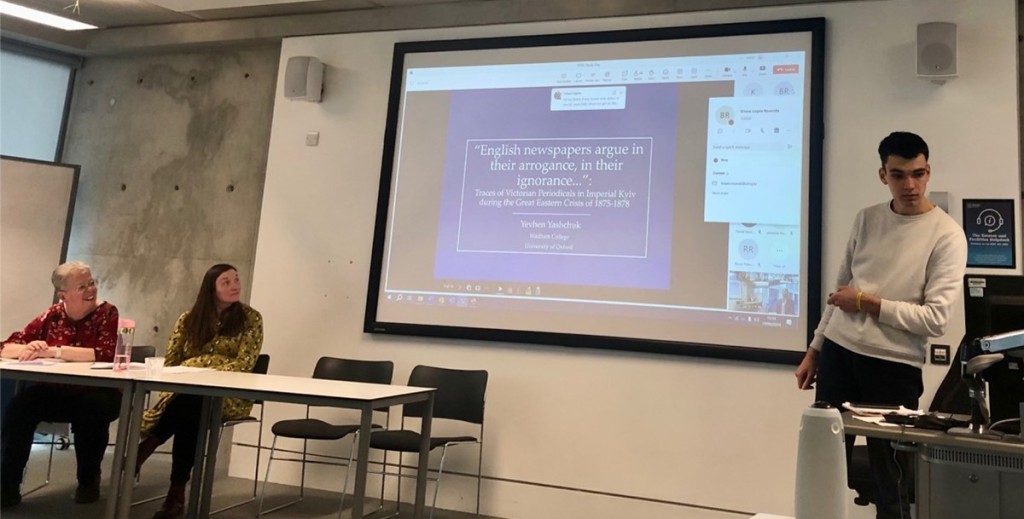Michelle D. Ravenscroft (MMU)
This collaborative Victorian Popular Fiction Association (VPFA) hybrid event, was organised and hosted by Betty Hagglund, VPFA/Centre for Research for Quaker Studies (CRQS) Birmingham City University, Jon Potter, Birmingham City University, and Emma Liggins and Sonja Lawrenson, Long Nineteenth Century Network/Manchester Metropolitan University, and MMU Special Collections. The day brought together scholars of periodicals and popular fiction, and those curious to discover more about this area of research, with the aim of asking fundamental questions about the intersections between periodicals and ‘knowledge’, in its many forms. Having attended numerous events in the series, my expectations for the day were high, and I was not disappointed.
Jon Potter started proceedings with an overview of the AHRC-funded Project, ‘Thinking Machines: Constructing Knowledge in the Victorian Periodical Press’, which aims to identify the relationship between knowledge, industrial technology and publications from 1830-1860. Jon then introduced keynote speaker, Annemarie McAllister, Senior Researcher in History at University of Central Lancaster. Annemarie’s paper analysed the tropes and characteristics of Temperance publications, and how drama and sensation were used as forms of propaganda to support the messages of the Temperance Movement. As the paper came to a close, Annemarie highlighted the importance of making both online collections and physical copies of periodicals freely accessible.
Accessibility was a recurring theme, and Emma Liggins, Manchester Metropolitan University, followed the keynote with an introduction to the exhibition, ‘Nineteenth-Century Mass Media: Magazines, Annuals and Scrapbooks’, co-created with Brian Maidment and currently on display in MMU Special Collections. Emma explained the decision behind the ‘student-friendly’ name of the exhibition, that helped to define the content in an attempt to encourage students to engage with
the periodicals.



Artifacts included in the exhibition range from a selection of the late nineteenth-century illustrated quarterly, The Yellow Book, to examples of working-class periodicals, such as The Mechanic’s Magazine.

As delegates moved into the Collection space, Melissa Hevingham, Manchester Metropolitan University, revealed her carefully curated exhibition, ‘Branwell Bronte: Masculinity and Illness’, which includes a reprint of Branwell’s famous self-portrait, and a copy of Blackwood’s Magazine. We also had an opportunity to engage with an eclectic range of nineteenth-century publications, including periodicals such as Belgravia, The Dial and The Lady’s Magazine, as well as temperance fiction, children’s literature, cookbooks, fairy tales and examples of scrapbooks from the Harry Page collection.

The visit to the Special Collections was followed by lunch, and the opportunity to network, before the first panel of the day, ‘Translating Knowledge for Different Audiences’. Speakers, Sumaira K. Naseem, Betty Hagglund CRQS/VPFA, and Sarah Dutson, Manchester Metropolitan University, shared a diverse and exciting range of papers. Sumaira sensitively explored the links between the idolisation of vampiric fascination and the normalisation of childhood mortality. Next, Betty shared initial research into the Salvation Army periodical, The Darkest England Gazette, and how its communications attracted non-Army readers by combining representations of their middle-class lives, Salvation Army theology, and a sensational finish. To conclude the panel, Sarah’s research into the connections between Neo-Victorian novels and the Spiritualist press revealed how the novels are self-aware of their recreation of the past. The paper ended with a consideration of how Spiritualist periodicals offer ways to analyse gender imbalances within the Spiritualist Movement.
Panel 2, ‘Traces, Palimpsests and Obscured Elements’, began with a paper from Yevhen Yashchuk, University of Oxford, which highlighted attitudes towards the ‘Eastern Question’, through analysis of under-studied sources, and how journalists managed to engage with censored newspapers, via their opinion pieces. This was followed by a paper presented by Janine Hatter (co-written by Craig Johnson), University of Hull, which focused on hidden knowledge and ghostwriters, relating to M. E. Braddon’s writing and editing practices, and analysed using new digital humanities methodology. Finally, an engaging online presentation by Owen Monroe, University of Illinois, Urbana-Champaign, also employed a digital approach, to illustrate how the technological revolution influenced ideologies and scientific knowledge in the re-use of text in periodicals, such as Penny Magazine.

The day closed with the ‘Gender and Genres’ panel. The common theme of categorisation was prevalent in the paper by Clare Horrocks, Liverpool John Moores University, which revealed a collaboration with Gale Cengage, that considered the women contributors to Punch, and the language around wit, satire and comedy. Emma Probett, University of Leicester, shared a new and vibrant approach to analysing reviews of publications categorised under the Novel of Manners genre, whilst the final paper of the day, presented online by Rebecca Nesvet, University of Wisconsin-Green Bay, creatively explored the role of self-knowledge and gender fluidity in Rymer’s Ava the Betrayed.

The day had a collegiate and constructive atmosphere, and the collection of presentations enthused and enlightened, by revealing many new and exciting ideas and opportunities for the exploration of knowledge in Victorian periodicals. My continued reflection is a small testament to the success of the event, and the diversity and dynamism of the projects.
Author Biography
Michelle D. Ravenscroft is a PhD Candidate with the Department of English at Manchester Metropolitan University. Her research, Reading the Manchester Man 1806 – 1900: History, Culture, Identity, and the Portico Library and Collection, focuses on literary representations of nineteenth-century Manchester and the figure of the Manchester Man, explored through the Portico Library archives and Collection. Michelle co-organises the MMU PGR ECR Long Nineteenth Century Research Group, and is Principal Editor of The Hive Journal.